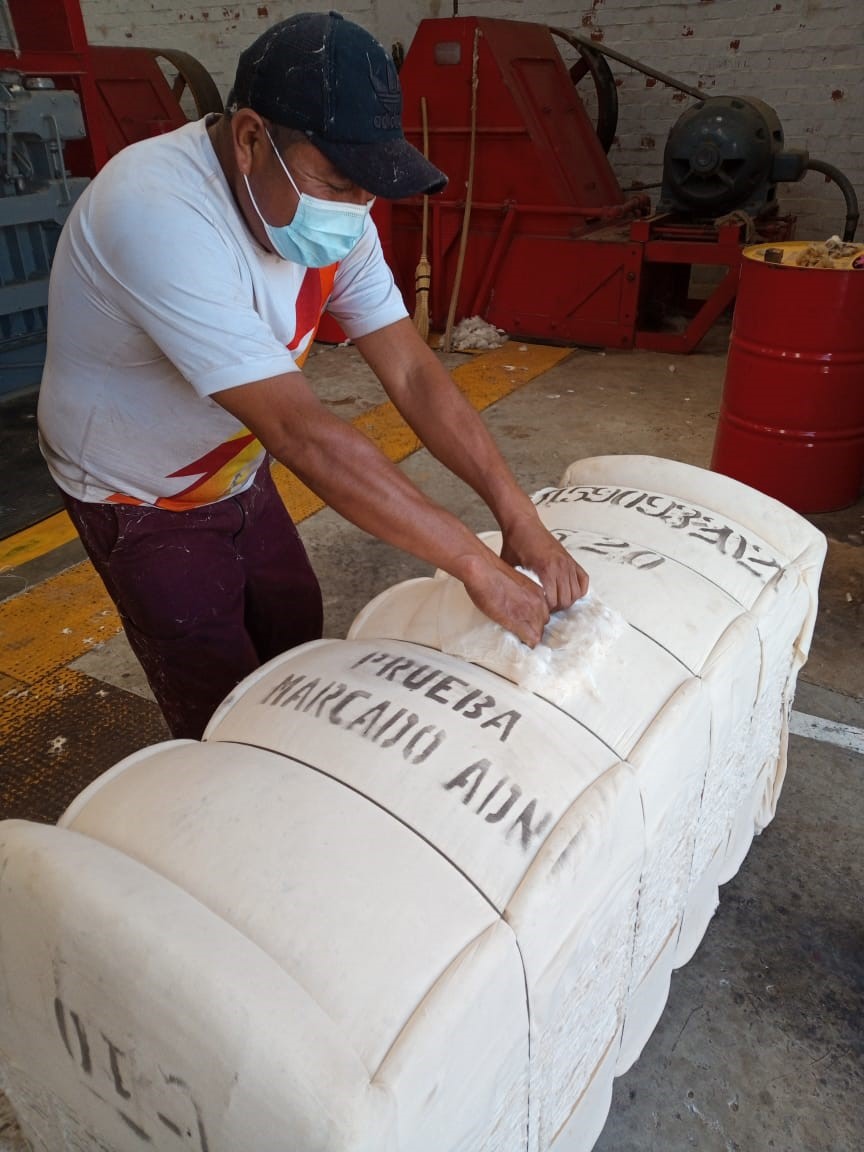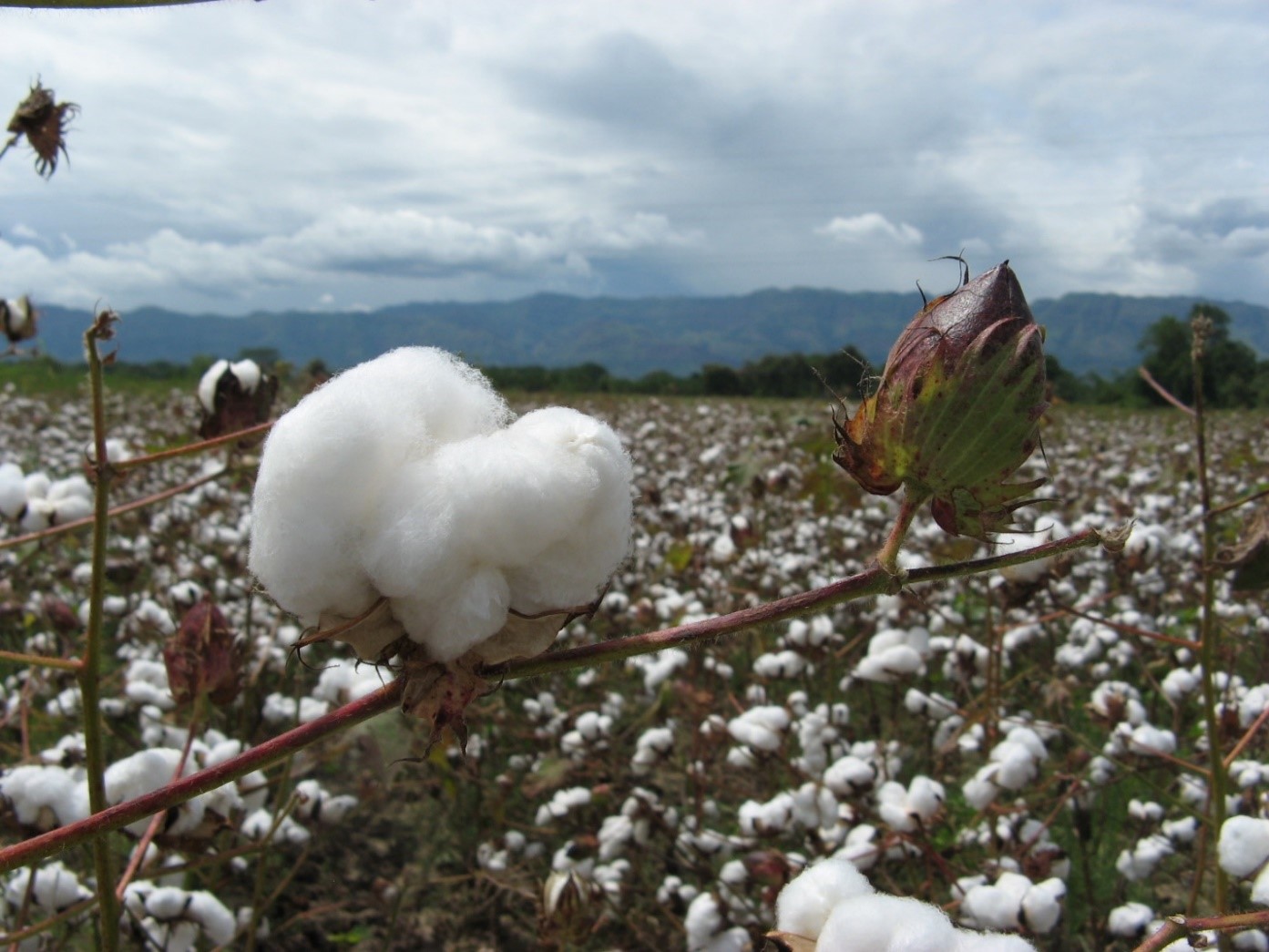+Cotton Project - Blockchain Technology
Blockchain technology and trilateral South-South cooperation for the socioeconomic inclusion and digitalization of the cotton sector in Latin America
Challenges
For the last two decades, the Peruvian cotton value chain has suffered from low competitiveness, a trend highlighted by decreased cotton productivity and by a downturn in quality, a decline in textile and apparel production and limited access to markets.
In Peru, 100 percent of cotton production comes from family farmers who are directly affected by access to certified seeds, regular technical assistance, quality supplies, access to mechanization technologies and digitization of production. Moreover, access to markets is limited to the extent that there is a disarticulation between cotton producers and the textile industry, which has led to an increase in cotton imports into the country for the manufacture of yarn and garments; on the other hand, due to the lack of traceability and fibre quality levels the positioning of Peruvian fibre in regional and international markets is problematic.
In this context, the blockchain pilot in Peru aims to implement traceability and transparency systems that provide evidence of the quality of cotton fibre; to improve registration and control systems for cotton cultivation by family farmers; to enhance the articulation among the actors in the cotton chain; and to implement a traceability system that recognizes the origin of Peruvian cotton from seed to garment. All of which will have a positive impact on sustainable development thereby bridging the gap of cotton family farmers’ access to digital technologies for traceability and for better entry to markets providing added value to their products.
Towards a Solution
The FAO Regional Office for Latin America and the Caribbean, through the +Cotton project supported by the Brazilian Cooperation Agency (ABC), jointly with the United Nations Economic Commission for the Europe (UNECE), are implementing a pilot project for traceability and transparency of the cotton value chain in Peru based on blockchain technology, integrating cotton family farming, the national textile-garment industry and an international fashion company. Technological innovation contributes to the reduction of socioeconomic gaps and the inclusion of cotton family farmers in differentiated markets thereby adding value to their production. In this context, the digitalization of agriculture in the cotton-textile-garment sector is the basis for a more inclusive and sustainable value chain in the transition to a circular economy. Through South-South cooperation established by the Government of Brazil, FAO and the Government of Peru, the +Cotton Project seeks to share good practices and knowledge for the improvement of the cotton sector.
UNECE facilitates the Blockchain Platform and technical assistance for the implementation of the technology. FAO contributes to coordinating the actors at field level and provides technical assistance to family farmers cooperatives for sustainable production practices and better capacities to market access, including the sharing of good practices from Brazil and other countries in the Latin American region.
The blockchain pilot allows the testing of technologies for inclusive cotton value chains, a process which integrates the productive link to verify the important step of tracking the product transformation and adding value to the cotton production to the benefit of all actors. It is the first pilot in the Latin American region to implement blockchain technology allowing the tracing of the cotton and the DNA marker technology with molecular marking of the fibre thereby diminishing the technological gap for cotton family farmers.
The pilot involves three main actors in producing, transforming and commercializing apparel collection:
The Costach cooperative, consisting of around 5,200 families in the Piura region, northern Peru, produces 10 tons of cotton fibre. Creditex, a private company, heads the entire process from the ginning, spinning, dying, weaving to the final elaboration of the products. Creditex has around 1,460 employees; and at the end of the chain is the company, CAT’s Pyjamas, which is in charge of the placement of the products, offering the final product, a luxury pyjamas collection in the US market. The sustainability of the initiative is based on an unprecedented dialogue among cotton producers and the industry to improve the technology and the search for new partners.
The initiative, through the traceability of all the transformation processes of the cotton, provides evidence of sustainability standards and certifications for the mitigation of sustainability hotspots. In particular the use of chemicals according to the Oeko TEX 100 certification and the social compliance of the garment manufacturer, certified by the Worldwide Responsible Accredited Production (WRAP) certification. Both certificates were mapped through the blockchain platform of the pilot.
Improving transparency and traceability has become a priority for the apparel and footwear industry to increase its ability to manage its value chains more effectively; to identify, mitigate and address environmental, human rights and labour rights impacts; to combat product counterfeiting; and to manage business risks. Currently, many companies have limited insight into the network of trading partners within their value chain. Most can identify and track their immediate suppliers (level one), but information is often lost, as per a UNECE study showing that only 34 percent of fashion companies implement tracking and tracing in their supply chain – and most only reach level one (UNECE, 2019).
One lessons learned was the importance of supporting initiatives for the digital education of farmers, including in the use of apps and in the development of capacities to generate digital contents when appropriating the requisite technologies, including increased access to open-source technologies. Public-private alliances also need to be generated to facilitate access of connectivity infrastructure in rural areas.
Innovation, traceability and transparency initiatives should support family cotton farming through: planned production based on contract farming; access to credit; incentives for exports and domestic consumption; technical assistance and rural extension; agricultural innovation; and a chain that shares risks and profits, based on principles of fair trade and focused on consumer preferences. It is essential that Peru and other countries in the Latin America and Caribbean region continue to encourage competitive strategies in markets, such as traceability and transparency, thereby contributing to sustainability and to scaling up these initiatives to the regional level through ensuring inclusiveness.
Contact Information
Adriana Gregolin, Regional Coordinator of +Cotton Project, Food and Agriculture Organization of the United Nations (FAO) Regional Office for Latin America and the Caribbean
Countries involved
Brazil, Peru
Nominated By
Food and Agriculture Organization of the United Nations (FAO)
Supported By
FAO Regional Office for Latin America and the Caribbean, Brazilian Cooperation Agency (ABC), the United Nation Economic Commission for Europe (UNECE)
Implementing Entities
FAO, Creditex and Costach cooperative of Peru; Cat’s Pyjamas (private entity of USA)
Project Status
Completed
Project Period
1/2021 - 7/2022
Sectors
Agriculture, Food and Rural Development, Capacity Building, Digital Transformation
URL of the practice
https://www.fao.org/in-action/program-brazil-fao/news/ver/zh/c/1440765/ https://www.youtube.com/watch?v=LOKxxYkDqrQ&t=35sPrimary SDG
10 - Reduced Inequalities
Secondary SDGs
09 - Industry, Innovation and Infrastructure
Primary SDG Targets
10.3Similar Solutions










